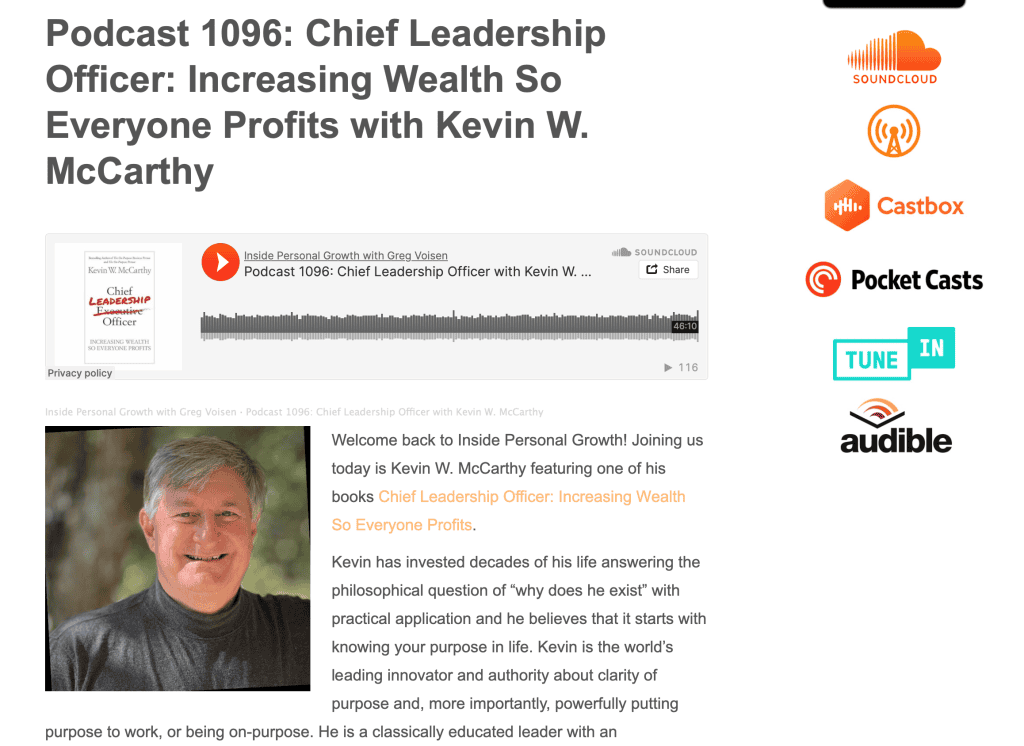Below is a screenshot of this interview and link to the video. Click here or on the image below to hear or watch. Scroll further down to see an excerpt from the interview about why CLOs instead of CEOs.
Greg and I first met in the mid-1990s when he was certified to facilitate The On-Purpose Program, a one-day program taking participants through the steps in The On-Purpose Person. We’ve been colleagues ever since.
Greg was podcasting before podcasting was popular. All the proceeds from his podcast go to his non-profit Compassionate Communications Foundation that works with the homeless and Ukrainian refugees. If you appreciate his efforts, please consider a donation.

Excerpt from the interview (lightly edited)
Greg Voisen: What inspired you are challenged, you challenged you to challenge the traditional CEO role, and propose the concept of what you’re referring to as the chief leadership officer? And how do you really define that? What do you define is the differences for somebody who’s a chief leadership officer versus a chief executive officer, where you crossed it out on the book?
Kevin W. McCarthy: What’s the difference? Most people, if you ask people that work in a company, would they sooner be executed or sooner be led because executives execute, and chief leadership officers lead. There’s a long sort of arc, if you will, in terms of some things that are going on that brought about this message. Part of this is because I’ve been such a pioneer in the purpose area, I recognize that, you know, if you go back 100 million that way, let’s say 1000 years ago, when people were more than that, actually what you get back 10s of 1000s of years, when people were hunter gatherers, the work of their hands was what they did, then they got a little smarter, and they learned how to, you know, corral some animals and plants and things and they become emerged from hunter gatherers to sort of an agrarian society. But still, it was the work of their hands. And then they got as a their minds began to free their hands up a little bit, we move into sort of fast forward into the Industrial Revolution, where we are now working with our hands today, most of us our hand activity is this. You were sitting in a keyboard. And so our minds the knowledge age, if you will.
So the logical thing is that the age beyond the knowledge age or the digital age, even the AI age is the heart. So we’ve gone from our hands to our heads to our hearts. And what’s happening is we’re in an era where meaning and purpose are today. I mean, when I started this work 34 years ago, nobody was talking about purposes, particularly as a heart issue. And so what’s happened is the idea of a CEO is the Industrial Revolution inventions there prior to 1950. There were no CEOs there were only presidents and CEOs were the idea of a group of companies coming together, led by each company is led by a president and the CEO was the person who was over these presidents or these divisions.
Of course, today, you have a guy driving around with an F 150 pickup truck and a bag of tools in his card says CEO. It’s kind of lost its meaning in that regard. But the fact is, is it’s a it’s a leftover from an industrial revolutionary mindset. As are words like human resources, which is a pejorative term that looks at people as resources rather than human beings. And so what’s happened is the CEO system of management has gradually dehumanized. And again, I’m not, I’m a pro business, love business, entrepreneur.
So I’m not bashing business. But what happens is the system of management has so dehumanized people that corporations are hard, having trouble hiring good people, retaining people, the sort of the chewing up and spitting up people is really a it’s a high price that people are paying. And so as a result, the idea is the difference between a CEO and a clo, is that CEOs are doing business, what I call incompletely right? Words, they’re looking at the numbers, they’re looking into profits, and I’m a profit guy. But profit is a byproduct of a system that is designed to produce the profits. However, that system relies upon purpose plan, its people, processes, performance measures, and all of these things that go in.
And as a result, if you take the people component, and you which is so vital to what’s going on, and you diminish them, you are diminishing your profits, you’re diminishing the effect of what you’re doing. So a clo does everything a CEO does, but understands where and understands the importance of the people component that we’ve got to take care of, we’ve got to do right by the people not take care of you got to do right by the people.